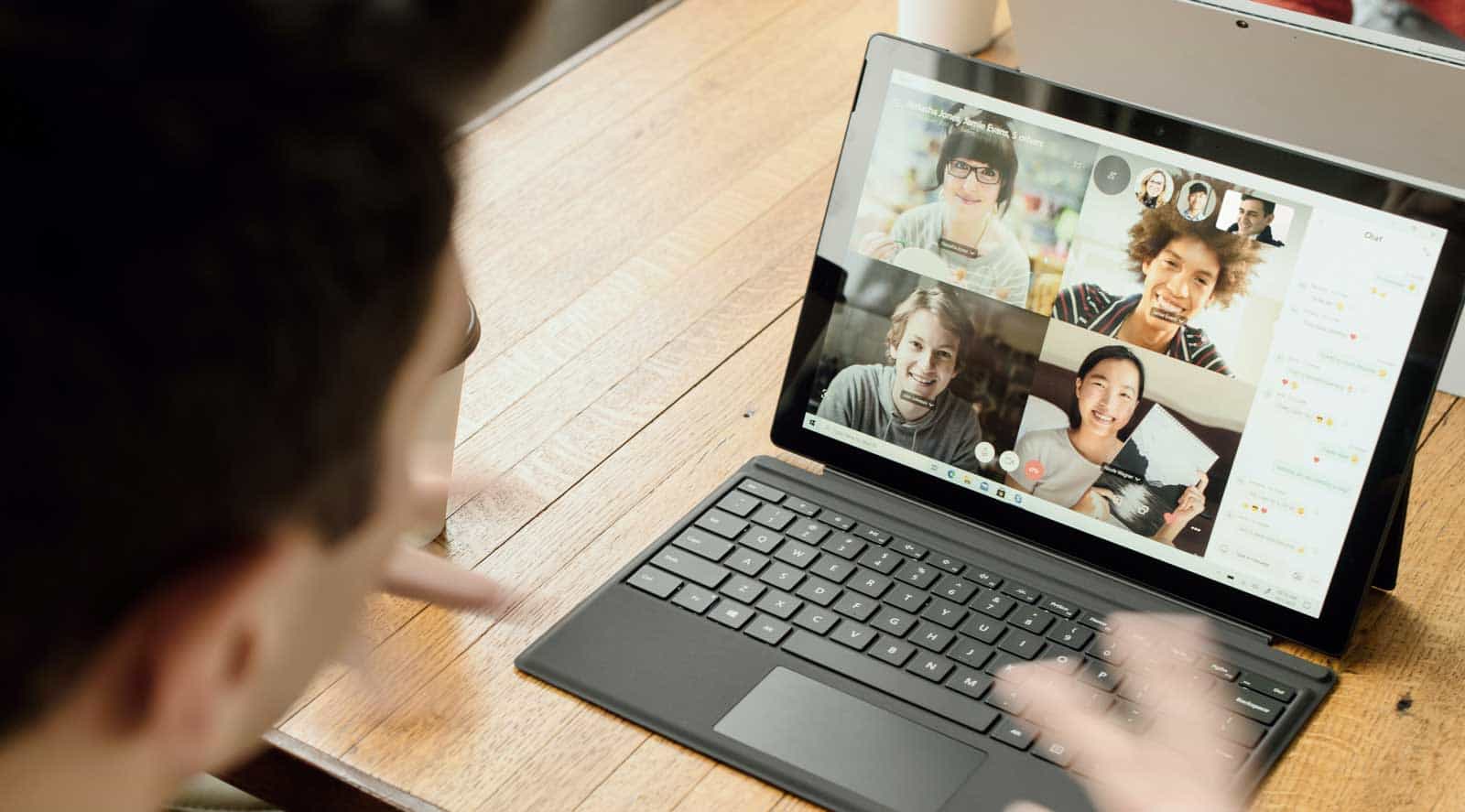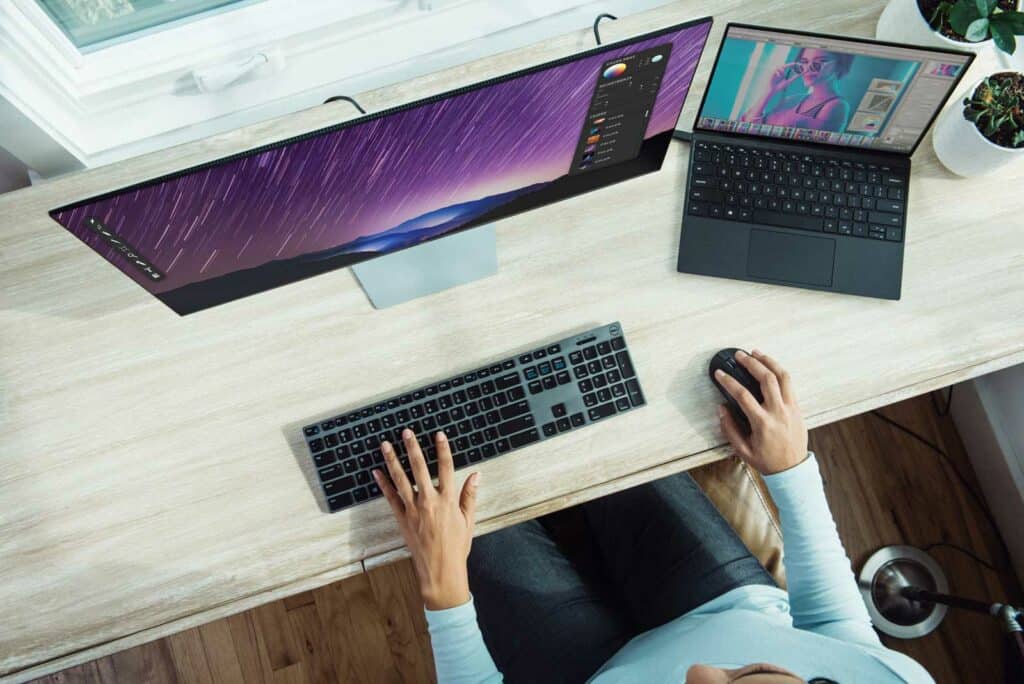Remote workers often use video call services like Zoom, Face Time, or WhatsApp to stay connected with their clients and other team members via video chats.
Emails and instant messaging services are also a normal part of everyday life working from home, not to mention the use of online directories and search engines for research, along with Spotify or YouTube for background music while you work.
Whether it is video conferencing, use of streaming services, e-learning, email, or social media, the use of a high-speed internet connection is a basic requirement. Therefore, to successfully work from home, a high quality internet plan and high-speed internet connection is an absolute must.
So how much data do you need to work from home?
The amount of data you need to work from home largely depends on the type of work you do and the applications you use regularly. However, here are some rough estimates for common tasks:
- Email: A text-only email is usually around 0.1 MB, but if you’re sending or receiving attachments, it could use up to 5 MB or more per email.
- Video conferencing: For example, Zoom consumes around 1.5 – 3 GB of data per hour for group video calls on the highest setting, but this can be reduced to less than 1 GB per hour on lower settings.
- Web browsing: General browsing can consume around 150-250 MB per hour.
- Streaming: If you listen to music or podcasts while working, this could use around 150 MB per hour. Video streaming, such as attending webinars or online training, uses more, around 3 GB per hour for HD quality.
- Cloud Applications: If you frequently sync or upload files to the cloud, this could use a significant amount of data depending on the size of the files.
- Software updates: These can use up to several gigabytes of data, especially for major system updates.
As a basic guideline, if you’re mostly emailing, browsing the web, and doing video calls, 100-200 GB of data per month should suffice for a typical 8-hour workday scenario. If your job involves a lot of HD video streaming, downloading large files, or similar data-intensive tasks, you might require 300-500 GB per month or even more.
It’s also crucial to consider other household data needs if you’re sharing your internet connection with others. These figures can vary widely, so it’s best to monitor your data usage over a typical work week to get a more precise estimate.
With the increase and dependence on mobile internet usage, one would wonder how much data is required to conveniently run an office space from home.
Internet services providers offer data and internet access with different packages to choose from.
However, it might not be easy to determine how many Gigabytes of data will be needed with the increase in daily internet usage by remote workers and professionals.
But how do you know how much data you need?
How many GB of data is consumed in an average home?
How many GB of data does an average person use?
Does working from home require more data?
What is the right Internet bandwidth necessary to work from home?
How much GB of data do I need for high-quality video streaming services?
Real quick: before we get too far along here, if you want to get more great ideas for your gaming room or home office and connect with other home office hackers to make your space the best join my free private Facebook group, Home Office Hacks here.
How much data do you need to work from home?

The average daily in-home data usage for PC/Mac in the United States before the pandemic was 700 Mbs, but it spiked to 1 GB in 2020. The figures also went from 3.9 GB per day to 5.4 GB for Streaming Box/Stick [1].
With the advancement of technology providing tools like Skype, Facebook, WhatsApp, Facetime, Zoom, cloud computing apps & instant messaging apps, and email, you no longer always need an office space to conduct effective work.
Remote working or work from home jobs has been on the uprise since the start of the pandemic in 2020.
Employees, professionals, sales staff, and even freelancers have adopted the “work from home” option, which allows them to carry out tasks, make sales and build project modules from their homes using the right technology.
- Is 30GB enough to work from home?
- Is 20GB enough to work from home?
- Is 50GB enough to work from home?
Some internet providers will put a data cap on the amount of data you use and will charge you overage charges which can get really expensive, so it’s vital that you have the right internet plan in place to begin with.
Below is a table that estimates the amount required on the number of users and tasks:
| No. of Persons | Tasks/ Activities | Amount of data required /Month |
| 1 Person |
|
10GB |
| 1-2 Persons |
|
25 GB |
| 3-4 Persons |
|
50 GB
|
| 4+ Persons |
|
100 GB |
*The bandwidth requirement can vary depending on other factors too.
The more data you have, the better. You need enough data to create a viable working environment.
Simply evaluate the factors we mentioned earlier and compare them to your work routine to determine how much data you’ll need for a certain period of time.
Does working from home use a lot of data?
Ultimately, everything that is done via the internet requires data – with video streaming, music streaming, and downloads of large files consuming the most.
However, for a remote worker, the amount of data needed varies and depends on the type of the job. For instance, a sales staff employee who implements video chats and internet calls to connect with clients might require about 500 MB – 2.5 GB of data per hour.
Basically, the amount of data that a remote worker will consume depends on the type of job and the amount of time spent on the internet.
What work tasks use the most data?

It’s amazing to think about how fast your every-day responsibilities add up when it comes to using up your data plan.
So where are the areas of your work that are using the most data?
First off, nothing beats video streaming when it comes to eating up data. Video conferencing is huge a big data user. Think about all those face-to-face Zoom calls that you have to be a part of – if you’re video chatting with colleagues or clients, you’ll be using quite a bit of data.
What about that background music you’re playing on YouTube? Yep – another huge consumer of data. Same goes for Spotify. I love background music as much as anyone, and I’ve even got it running now while I work on this post. But it will eat up your data quickly.
Next is large package downloads. This is especially true if your designer or developer. The files you work with are large – sometimes several GB in size. Video files are an even bigger and moving those around will eat up your plan quickly.
Finally – and you may not have really even thought about this one – the webpages you visit. Each page you visit is saved on your computer in your browser cache. One page here another page there, isn’t a big deal. But if you’re like me you’re visiting numerous sites every single day and some of those sites are downloading pretty large files onto your computer.
What is the right internet bandwidth necessary to work from home?
Don’t you hate it when the video lags in an important board meeting? Or when it takes an eternity to just download a small email attachment?
With internet connection being an essential tool for any employee or freelancer working from home, the average internet transmission speed has to be considered and in optimal supply.
A remote worker has to determine the right amount of internet speed required to run a productive and effective home office.
A person will require an average of 10 Mb/s of download speed and 1 Mb/s of upload speed in order to work from home effectively. At that speed, multiple instances of internet connections can run simultaneously without interruptions.
Simply put, a faster internet speed will help you wrap up your work faster and more efficiently. 10 Mb/s is good, but 100 Mb/s is better!
What about mobile data? How many GB of data do I need for my mobile phone?

If you’re working remotely there may come a time where you don’t have a reliable WiFi service available and you need to tether off of your mobile phone in order to be able to do your job.
So how much cellular data do you need for your mobile plan?
For simple web browsing, and basic smart phone use 15gb per month should be sufficient.
If you’re stream video, doing video calls, or doing any kind of resource-intensive work via a tethered connection to your mobile phone, then you will need at the very least 50gb of data per month on your plan.
Keep in mind that if you’re just streaming standard definition video, that can use as much as 700MB per hour so it’s very easy to burn through a lot of data very quickly.
The good news is that virtually all carriers offer unlimited plans these days and they’re relatively affordable. However, there are usually data caps on the quality of service you get. Big carriers like Verizon will throttle your speeds once you hit a certain threshold depending on your plan, so choose your wireless service carefully and read the fine print of those promotions for “unlimited” data plans.
How many GB of data is consumed in an average home?
The average amount of data consumption by households has increased rapidly over the years – reaching an all-time high in 2022. Households are estimated to be consuming as much as 3.5 times more internet data than they were using five years ago[2].
| Year | Average Monthly Internet Data Usage |
| 2012 | 25 GB |
| 2014 | 40 GB |
| 2016 | 97 GB |
| 2018 | 268 GB |
| 2020 | 344 GB |
| 2022 | 514 GB |
Over the last ten years, internet usage has expanded exponentially – with an equal increase in internet bandwidth.
Internet service providers have improved their utility by introducing broadband and high-speed internet access to match the growing mass of users and high adoption of video streaming services requiring large data plans and high-speed internet transmission.
How many gb of data does an average person use?

There’s obviously no doubt that the average individual consumes more internet data daily than ever before.
With video stream services like Netflix, YouTube, Hulu, Amazon Prime – just to mention a few – offering millions of high-quality video content accessible on various mobile platforms and devices, the average amount of data consumed by every person is constantly rising.
In 2020, the average person consumed about 4.5 GB of data on the internet on activities ranging from video streaming, music streaming, emails, video chats, and social media [3].
How many gb of data do I need for hd video streaming services?
According to studies by online video viewers survey in 2020, 27% of viewers watched as much as 10 hours of video content online.
Using video stream services like Youtube, Netflix, and Hulu for long periods requires a certain amount of bandwidth. Some internet service providers offer video stream data packages and unlimited data plans for this purpose.
The amount of data expended on a video stream usually depends on the service and the quality of video rendered by the platform. Low-quality videos typically consume about 300 Mb (0.3 GB) of data per hour, while video streaming at standard quality will consume up to 700 Mb (0.7 GB) of data per hour [4].
High-quality or HD video streams, on the other hand, require about 0.9 GB (for 720p), 1.5 GB (1080p), and 3 GB (for 2K) of data per hour, respectively, according to the video quality.
Next Steps
Want to join others who are creating the most amazing home offices and get more tips, tricks and hacks on how to make your home office the best it can be?
Join my brand new free private Facebook group, Home Office Hacks to connect with other home office hackers to make your space the best!
References:
- https://www.statista.com/statistics/1106863/covid-19-daily-in-home-data-usage-change-us-2020/
- https://www.allconnect.com/blog/average-household-internet-data-usage-has-jumped-38x-in-10-years
- https://www.statista.com/statistics/489169/canada-united-states-average-data-usage-user-per-month/
- https://www.androidcentral.com/how-much-data-does-streaming-media-use
